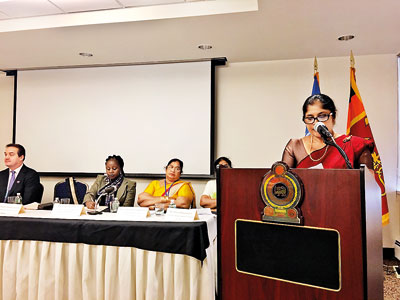Sunday Times 2
Lanka’s UN mission hosts panel talks on gender empowerment
View(s):UNITED NATIONS— The Sri Lanka Mission to the UN hosted two panel discussions last week to coincide with the 61st annual session of the UN Commission on the Status of Women (CSW) focusing on the themes: “Empowering Women’s Economic Leadership” and “Women in Post-Conflict Reconciliation.”
In her opening address, Minister for Women & Child Affairs Chandrani Bandara Jayasingha said Sri Lanka continues to make progress in achieving gender equality, in conformity with the 1995 Beijing Declaration and Platform for Action.
“We are doing so, by empowering women in the social, economic and political fields through progressive law reform; by formulating gender responsive policies and action plans; and by addressing the needs of the communities.”

Women and Child Affairs Minister Chandrani Bandara Jayasingha delivers the opening remarks
She said the Government is presently drafting a new Constitution through an inclusive process. Accordingly, the inclusion of women’s rights in the Fundamental Rights Chapter is also under serious consideration. During the past two years, she pointed out, the Government has focused on developing and obtaining policies and Action Plans. These include addressing such issues as violence against women, female headed households, women’s entrepreneurship development, and institutionalizing gender mainstreaming. “I am happy to report that Cabinet approval has been obtained for all these policies and action plans.”
The minister said eradicating rural poverty is a major concern of the government, and 2017 has been declared as the year of poverty alleviation. In addition to the regular credit schemes of the government and the banks, the government has introduced several credit schemes to obtain easy credit for entrepreneur development. A recent initiative by her Ministry is a policy directive issued by the Treasury for allocating a minimum of 25% of the annual investment for economic development of rural women.
One of the key priority concerns for her Ministry is eliminating violence against women. A new referral system with a multi-sectoral approach was introduced for redressing women victims of violence. Capacity development of the Police and the Judiciary is being conducted in order to create gender sensitivity in addressing gender base violence. “We have set up six shelters in several locations in the country for the protection of victims of violence, which are managed in collaboration with the NGO sector. A digital data base system has been developed for the collection of GBV data which is a long felt need in the country,” she added.
Addressing the meeting, Sri Lanka’s Permanent Representative Ambassador Rohan Perera said Sri Lanka’s 30-year conflict may be confined to the history books “but we have many challenges ahead, as we seek to heal the wounds of the past.”
“As Sri Lanka embarks on a transformative process of economic recovery, we recognize that the conflict has had a disproportionate impact on women’s physical and economic security. The post-conflict environment places a heavy financial care and burden on women. We are aware that the conflict has resulted in a large number of victims – orphans, war widows, single mothers and women headed households. Female-headed households now count for 25 percent of all households in Sri Lanka and challenges to women are compounded by socio cultural stigma attached to widowhood,” Dr. Perera declared.
Historically, he pointed out, Sri Lanka has made strides in the area of women’s empowerment. Universal Adult Franchise was introduced in Sri Lanka in 1931, free education for both boys and girls and free health care were introduced very early after Independence in 1948. Sri Lanka adopted a Women’s Charter two years before the “Beijing Platform for Action,” and there is a National Plan of Action on Women. Sri Lanka’s commitment to maternal and child health goes back more than a century. Sri Lanka has a maternal and child health record that is the envy of South Asia. Nowhere is this better reflected than in the maternal mortality ratio which is very low, he added.
Ambassador Perera said the Government, as part of its reconciliation process, established the Office of National Unity and Reconciliation (ONUR) to lead, facilitate and support national unity and reconciliation in Sri Lanka and it has helped in drafting national policy on reconciliation, including development plans for conflict affected areas, launching inter-faith programs, arts and culture programs, promoting education reforms to include peace, education and national unity components, among many other measures.
The Provincial Minister in charge of Women’s Affairs Ariyawathy Galappaththy, described as the first woman provinical minister in Sri Lanka, said women now constitute 52.5 percent of the country’s population. “They need to be specially empowered in order to harness their strength and move forward. This strength and empowerment comes through building their economic identity. However, in order to do so there must be responsible leadership,” she noted.
A second panel discussion focused on the theme: Women Peace and Security and the role of Women in Post-Conflict Reconciliation. Both discussions were moderated by Minister Counsellor Sonali Samarasinghe.

